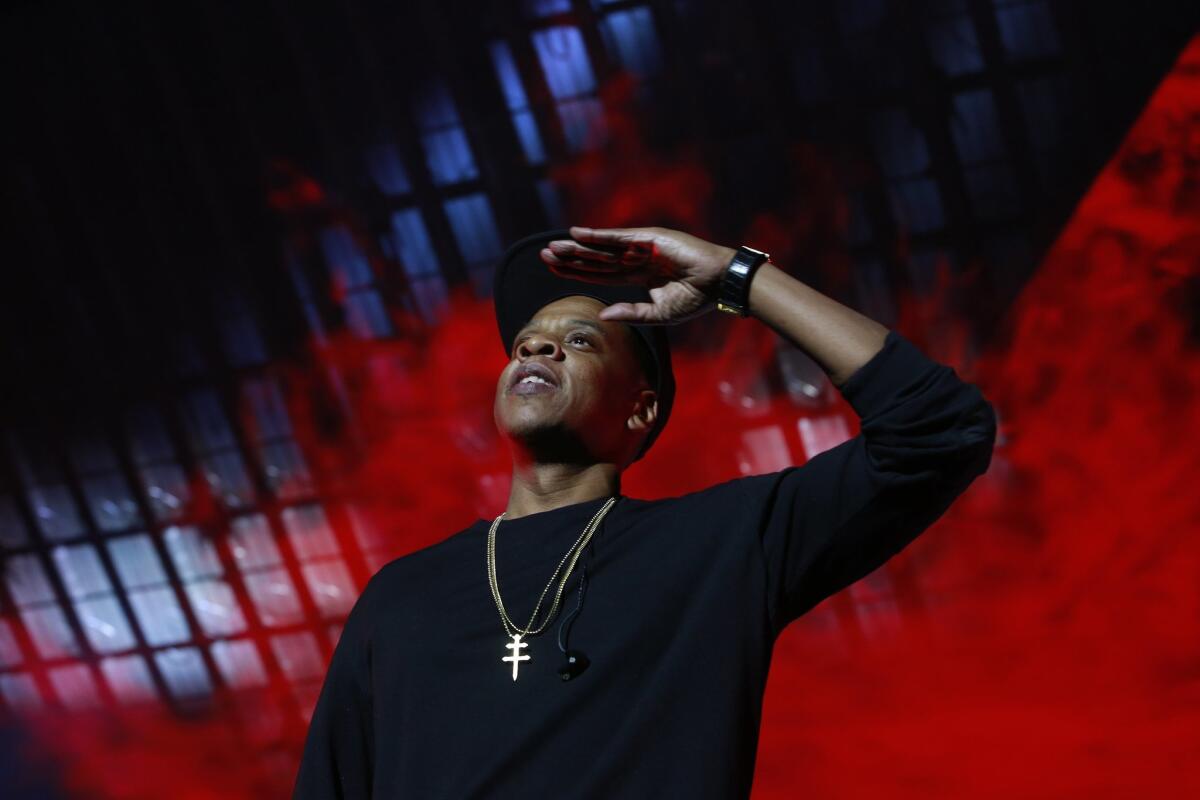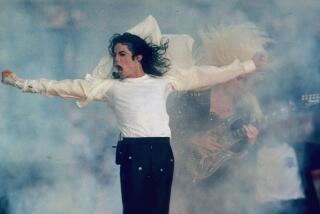Infringement lawsuit against Jay Z’s ‘Big Pimpin’ ’ is dismissed

An eight-year-old copyright infringement lawsuit against rapper Jay-Z, shown performing Oct. 20, 2015, in Brooklyn, N.Y., was dismissed this week by a judge in Los Angeles.
- Share via
A U.S. District Court judge in Los Angeles on Wednesday dismissed a copyright infringement suit filed in 2007 against rappers Jay Z and Timbaland that accused them of using elements of a 1957 song by an Egyptian composer without permission.
The judge, in throwing out the case before it reached trial, didn’t rule on the merits of that claim but said the nephew of composer Baligh Hamdi, whose song “Khosara Khosara” figured into Jay Z’s 2000 hit single “Big Pimpin’,” did not have the right to pursue the infringement claim. Judge Christina A. Snyder reportedly told jurors she was dismissing the case after consulting with experts in Egyptian law.
Hamdi’s nephew Osama Ahmed Fahmy argued in his lawsuit that Jay Z, whose real name is Shawn Carter, and Timbaland, born Timothy Mosley, had used bits of his uncle’s composition without permission. Both musicians testified in court that they had sought and received permission to use the flute notes from “Khosara Khosara” that appear several times in “Big Pimpin’.”
------------
FOR THE RECORD:
An earlier version of this article misspelled Osama Ahmed Fahmy’s surname as Fahmym. Also, it stated the judge dismissed the case before it reached trial. She dismissed it before it was given to the jury.
------------
Fahmy’s lawyer, Pete Ross, said following the decision, “We think it’s completely wrong, and we’ll appeal.”
SIGN UP for the free Essential Arts & Culture newsletter >>
Andrew Bart, Carter’s lawyer, said, “My client is pleased and gratified by the decision,” the Associated Press reported.
In addition, Christine Lepera, who represented Timbaland, members of Linkin Park and others named in Fahmy’s suit, said her clients “have maintained throughout that Mr. Fahmy has no right to sue for infringement, and that fact has now been established.”
It’s rare for superstars to testify in person in copyright infringement cases, but Carter and Mosley spent two days in the Los Angeles courtroom as witnesses.
“I like the song,” Carter testified at one point, noting that he still performs it in concert. “It’s pretty good.”
Robert Jacobs, a partner and co-chair of entertainment and media litigation at L.A.-based Manatt, Phelps & Phillips, said Wednesday, “The judge’s decision, which is still forthcoming, will clarify this further, but from what I’m understanding went on, the judge came to understand that the claim was not a traditional copyright infringement claim, but was a moral rights claim, and under U.S. law, [such claims] are limited. … It doesn’t apply to music.”
Jacobs, who has represented clients in infringement cases before Snyder previously but was not involved in this case, said an appeal “could be groundbreaking. I don’t believe there are any court of appeals decisions addressing this. … I think it will be helpful for all of us who practice in infringement, and in the music infringement area in particular, to get clarification from the [U.S.] 9th Circuit Court of Appeals on this.”
Follow @RandyLewis2 on Twitter. For more on Classic Rock, join us on Facebook.
More to Read
The biggest entertainment stories
Get our big stories about Hollywood, film, television, music, arts, culture and more right in your inbox as soon as they publish.
You may occasionally receive promotional content from the Los Angeles Times.










